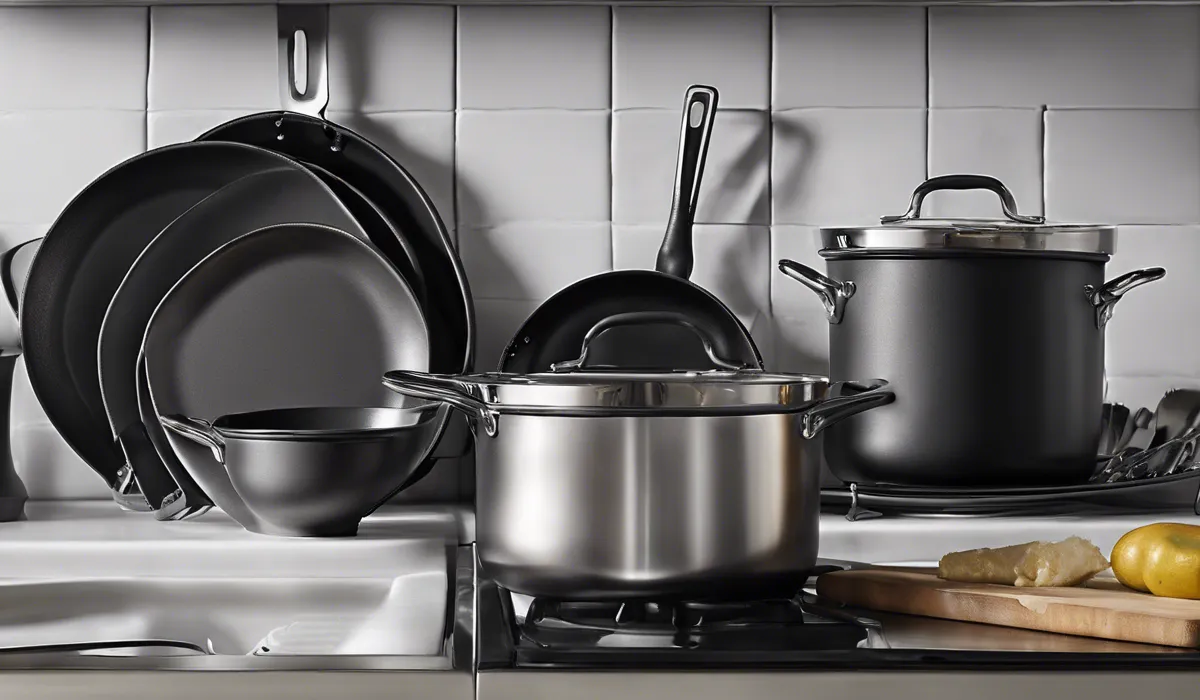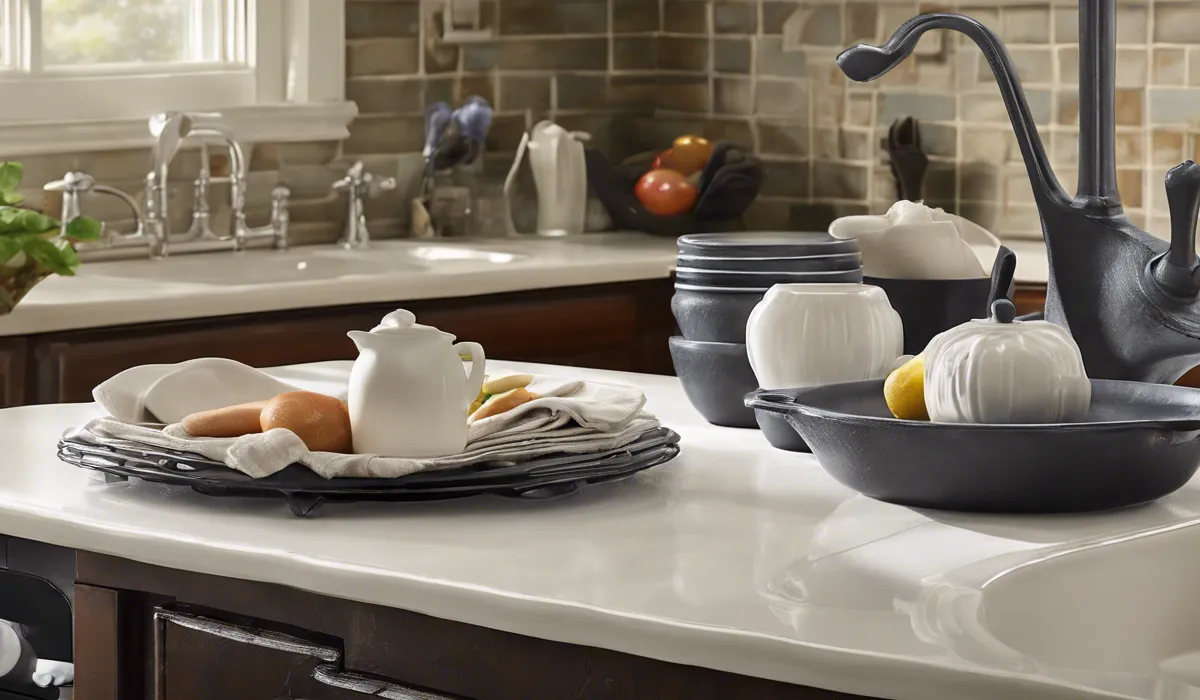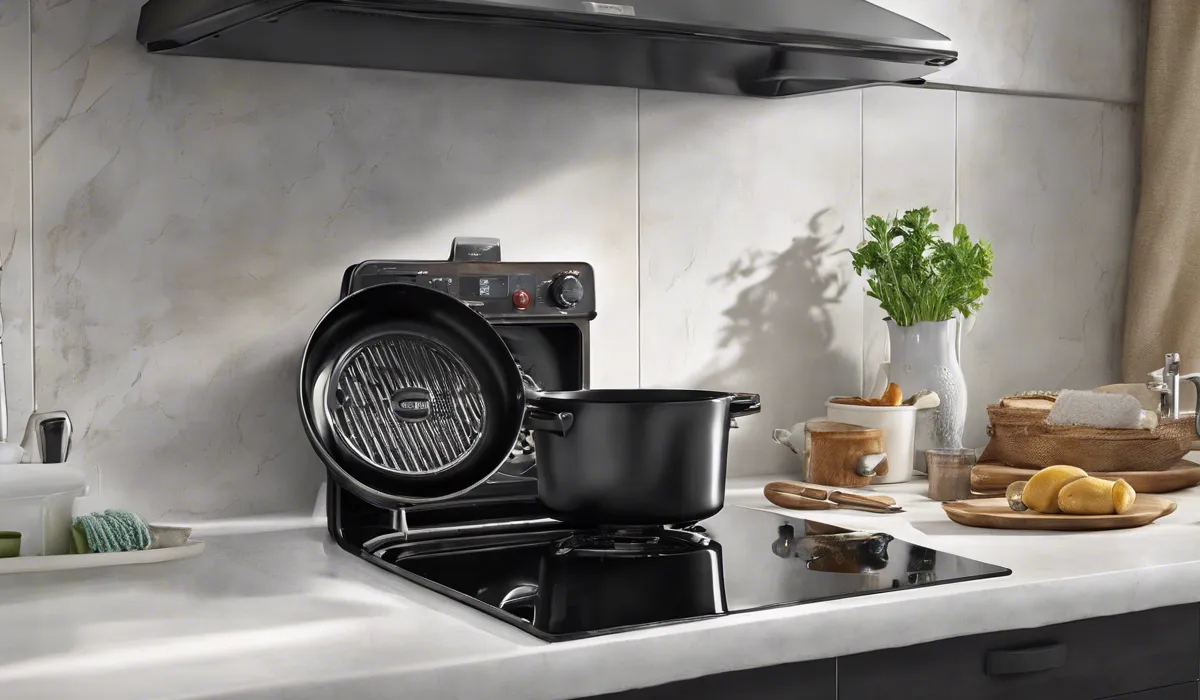Can You Put Cast Iron in the Dishwasher? The Truth Revealed!
It’s not recommended to put cast iron in the dishwasher as it can cause rust and remove the seasoning. Hand wash with mild soap and dry immediately to maintain its condition.
The Impact of Dishwashers on Cast Iron Cookware

Understanding Cast Iron’s Unique Characteristics
Cast iron cookware is a kitchen staple known for its durability and heat retention. It’s made by pouring molten iron into molds, creating a single, sturdy piece that heats evenly and can last for generations.
Unlike other cookware, cast iron improves with use, developing a non-stick surface through a process called seasoning.
This technique involves baking oil onto the cookware to create a protective layer that also contributes to flavor.
Negative Effects of Dishwasher Detergents
Dishwasher detergents are designed to be tough on grease and grime, but this strength is exactly what makes them harmful to cast iron.
These detergents can strip away the seasoned coating that is vital for a non-stick surface and protect against rust.
The chemicals in the soap react with the iron, leading to deterioration over time, which compromises the integrity of your cast iron cookware.
Rust Formation from Heat and Moisture
The combination of high heat and moisture inside a dishwasher can cause cast iron to rust. Cast iron is particularly susceptible to rust when its seasoned layer is compromised or not fully developed.
Rust not only damages the appearance of your cookware but can also affect the taste of your food and the overall lifespan of the skillet or pot.
Seasoning Layer and Dishwasher Cycles
Each time you wash cast iron in a dishwasher, you risk removing the hard-earned seasoning that makes your pan non-stick.
The seasoning is a layer of polymerized oil, a slick surface that’s built up over time and with regular use.
Dishwasher cycles, with their abrasive detergents and scouring action, can strip this layer away, leaving your cast iron dull and sticky, rather than slick and shiny.
Proper Care and Maintenance of Cast Iron

Why Hand Washing is King
To preserve the integrity of your cast iron, hand washing is the way to go. It’s a gentle method that protects the seasoning and prevents rust.
Use warm water and a mild soap—if needed—to keep your cookware in top condition. Avoid soaking the pan, as prolonged exposure to water can lead to rust.
Cleaning Cast Iron Step by Step
Cleaning cast iron by hand is simple. Start by wiping out any loose bits of food with a paper towel. If anything is stuck on, use a scrub brush or a plastic pan scraper to remove it.
For stubborn bits, you can use a paste of coarse kosher salt and water to scrub gently.
Rinse with warm water and dry the cookware thoroughly with a clean towel or by heating it on the stove for a few minutes. Remember to avoid leaving the cookware wet to prevent rust.
The Art of Seasoning Cast Iron
Seasoning is the process of baking oil onto the cast iron to create a non-stick, rust-resistant surface. To season your pan, coat it lightly with a high-smoke-point oil and bake it upside down in a preheated oven.
This process should be repeated periodically to maintain the non-stick properties and to build up a durable layer of seasoning.
Drying and Oiling Post-Wash
After each wash, ensure your cast iron is completely dry to prevent rust. Heat it on the stove to evaporate any remaining moisture.
Once dry, apply a thin layer of oil to the surface to protect it and help maintain the seasoning. This will keep your cast iron in prime condition and ready for your next cooking adventure.
Alternatives to Dishwashing Cast Iron

Using Salt and Potato Method
For removing rust and tough residues, sprinkle coarse salt into the pan and use a halved potato as a scrubber.
The salt acts as an abrasive, while the potato helps to lift away rust and food bits without damaging the pan’s surface. Rinse and dry your cookware thoroughly afterward.
Boiling Away Stuck-On Food
If you’re dealing with stuck-on food, fill the pan with water and bring it to a boil on the stove. The heat will loosen the food, making it easier to scrub away without harming your seasoning.
This method is particularly effective for cleaning after cooking items like rice or pasta that may stick to the pan.
Oven Baking for Deodorizing
Occasionally, cast iron may retain odors from strong-smelling foods. Baking your cast iron in the oven can help eliminate these smells.
It also can kill any lingering bacteria, ensuring your cookware is clean and safe for cooking.
Scrubbing With the Right Tools
To clean your cast iron without damaging it, use tools like chainmail scrubbers or stiff nylon brushes.
These tools are effective at removing food particles without scratching the surface or stripping the seasoning. Always follow up with proper drying and oiling to keep your cast iron in the best shape.
FAQs About Cast Iron Care
Can you put cast iron skillets in the dishwasher?
No, placing cast iron skillets in the dishwasher can lead to rust and strip away the seasoning.
What happens if cast iron goes in the dishwasher?
If cast iron goes in the dishwasher, it can rust and lose its non-stick seasoning, damaging the pan.
Is there any safe way to clean cast iron in the dishwasher?
No, it’s always best to hand wash cast iron with mild soap and dry it immediately to preserve its quality.
How should you dry cast iron after washing to prevent rust?
After washing, cast iron should be dried immediately with a clean towel and then heated on the stove to ensure all moisture is removed.
Can the seasoning on cast iron be restored after dishwashing?
Yes, if the seasoning is damaged from dishwashing, it can be restored through a process of cleaning, oiling, and heating the pan.
Final Thoughts
Cast iron should not be placed in the dishwasher as it risks rusting and stripping the essential seasoning.
To preserve its quality, gently hand wash with a mild detergent and ensure it’s dried immediately after cleaning. Proper care will extend the life of your cast iron cookware.





